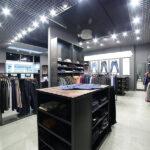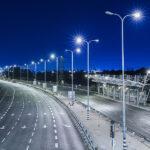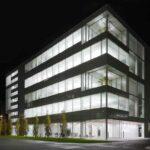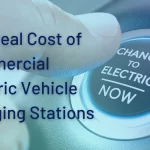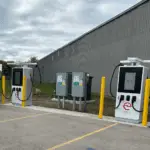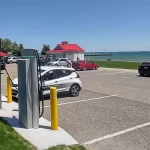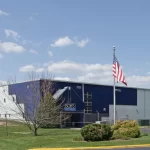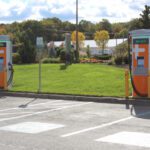DC Fast Charging Solutions for High-Speed Public and Fleet EV Infrastructure
Home » Solutions » EV Charging » DC Fast Charging Stations (DCFC)
DC Fast Charging stations offer the highest-speed EV charging available, capable of delivering 80% charge in 20–45 minutes. These stations are ideal for fleet depots, public corridors, retail centers, and municipalities looking to serve drivers quickly and at scale.
Table of Contents
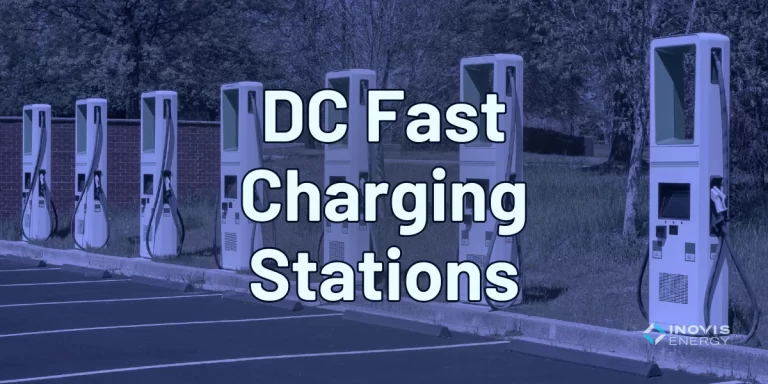
What Are DC Fast Charging Stations?
DC Fast Charging stations deliver high-powered charging directly to a vehicle’s battery using direct current (DC), bypassing the vehicle’s onboard charger. Unlike Level 2 charging, which can take several hours, DCFC can provide 60–250+ miles of range in under an hour—making it essential for:
-
Highway corridors and travel stops
-
High-turnover public or retail locations
-
Commercial fleets with tight charging windows
-
Municipal or utility-sponsored public access sites
-
Mixed-use developments looking to attract premium tenants or traffic
DCFC units typically range from 50 kW to 350+ kW and may support CCS, CHAdeMO, and Tesla-compatible standards (via adapter). Most DCFC stations are networked, allowing for payment processing, usage tracking, load management, and software control.
Why Install DC Fast Charging Stations?
Key Benefits:
-
Deliver 60–250+ miles of range in under an hour
-
Attract drivers to retail, food service, or travel corridor locations
-
Essential for fleet depots with short dwell times or long routes
-
Meet federal or state public charging infrastructure requirements
-
Support public access, tourism, and corridor development
-
Offer premium service levels that support pricing and revenue models
-
Enable demand response and managed charging participation
-
Future-proof sites for growing EV adoption and high-speed charging standards
- Achieve an attractive ROI in high traffic areas especially when combined with incentives
How Fast Is DC Fast Charging?
DCFC speed depends on charger output and vehicle compatibility:
-
50 kW stations add ~100–150 miles of range in 1 hour
-
150 kW chargers add ~200 miles in ~30 minutes
-
350 kW ultra-fast chargers (vehicle-limited) can add up to 80% charge in 15–20 minutes
Power availability, cable cooling (air vs. liquid), and station configuration all affect charging time and infrastructure needs.
All stations support CCS connectors, with optional CHAdeMO for backward compatibility and NACS (Tesla) support via adapter or multi-standard head.
Industries That Benefit from DCFC
Related Facilities
Fleet depots, travel corridors, service plazas, retail centers, universities, municipalities, and mixed-use developers looking to serve short-dwell EV drivers.
How We Deliver DCFC Projects
-
Site Feasibility Study – Evaluate existing utility service, layout, and traffic patterns
-
Utility Coordination – Work with the utility to secure sufficient capacity or transformer upgrades
-
Rebate & Grant Support – Navigate pre-approval for custom funding programs (NEVI, NCIP, etc.)
-
Equipment Selection – Match charger kW, port type, and software/network needs
-
Infrastructure Work – Trenching, conduit, switchgear, concrete pads, bollards, signage
-
Commissioning & Handoff – Configure charger settings, set pricing/access, and provide training
Incentives and Funding for DCFC Projects
DC Fast Charging stations often qualify for significant funding support, especially in public or corridor-focused deployments. Inovis helps clients identify and stack available incentives, which may include:
-
NEVI (National Electric Vehicle Infrastructure) program funds for corridor charging
-
State-level grants for publicly accessible or disadvantaged community chargers
-
Utility rebates for infrastructure, make-ready, or energy storage pairing
-
Federal tax credits up to 30% of installation cost under the IRA
-
Turnkey financing or Charging-as-a-Service (CaaS) with no upfront capital
-
Bundled project models for fleets, solar + storage, or property upgrades
Because DCFC has higher capital requirements than Level 2 charging, incentive pre-approval and infrastructure planning are critical to maximizing ROI and future expansion potential.
Some of Our Completed DC Fast Charging Stations (DCFC) Projects
Accelerate Your Charging Infrastructure with DCFC
DC Fast Charging stations provide the speed and flexibility needed for today’s fleets and future-ready public access. We’ll help you design, fund, and deliver a system that meets your goals and qualifies for available incentives.
